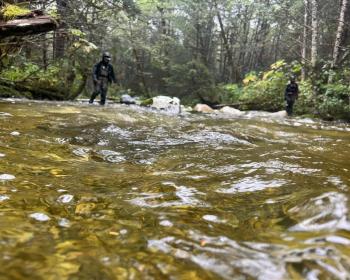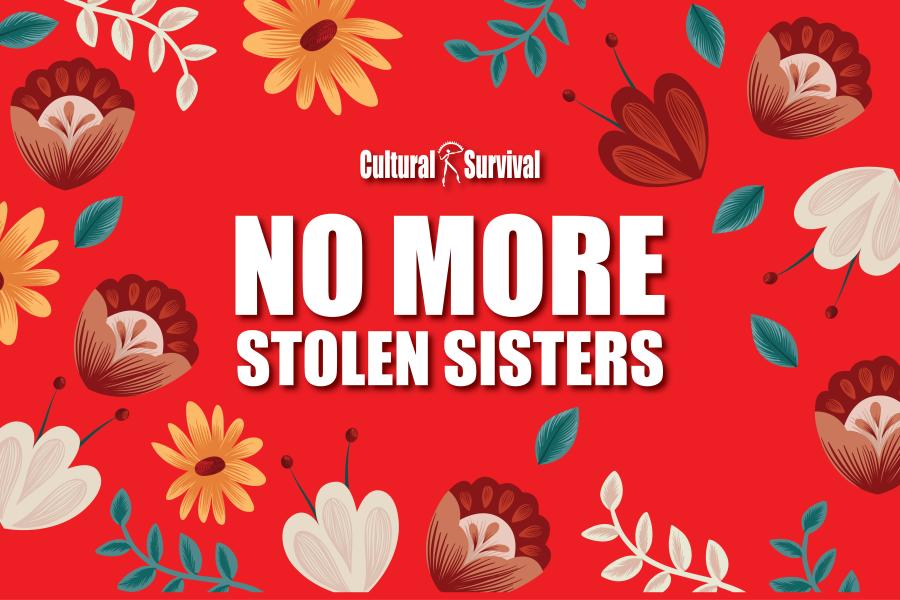Resource development can have significant impacts on indigenous women. Indigenous women are "crucial actors in biodiversity management in their multiple roles as farmers, herders, forest gatherers, primary health care givers, market vendors, selectors and preservers of seeds, soil conservationists, and keepers of the natural and built environment."(1) Indigenous women also play a crucial role in maintaining family and community structures, and in passing on traditional cultural ways.
It is essential that the mining industry identify how mining operations may potentially affect indigenous women's multiple roles in biodiversity management, social cohesion, and cultural integrity. Mining activities not only have negative effects on local and downstream environments and communities, but preliminary evidence suggests that mining often differentially impacts on indigenous women in economic, social, health, and psychological terms. A United Nations-sponsored seminar in Zimbabwe in 1993 identified gender issues in mining as a priority consideration to be addressed by the international community. (UNIFEM Southern Africa Regional Office, 1999) According to the Forest Peoples Programme, Philippine Indigenous Peoples Links, and the World Rainforest Movement (2000): "Mining projects impact disproportionately and negatively on women and their status." Yet consultation processes typically neglect gender issues.
Mining operations can clearly have notable impacts on the health and wellbeing of women. Environmental impacts can affect women's reproductive health. For instance, mining activities can lead to significant increases in sexually transmitted diseases (STDs) among women by placing socio-economic pressure on local women to engage in sex work and/or increasing male mine workers' utilization of sex workers and transmission of STDs to female partners in home communities. Not uncommon are sexual harassment and increased incidences of violence, sexual assault, and murder of indigenous women by the large numbers of transient male mine workers. Various forms of abuse of female partners and other family members frequently increase as a result of long-distance commuting of male mine workers. New mining ventures in or near remote indigenous communities can have devastating health impacts through the introduction of new diseases.
Indigenous women are also less likely to share in economic benefits that result from mining activites, both through lack of employment opportunities in a "male" industry and lack of capital transfer within families where the male head-of-house is employed in the industry. Environmental degradation caused by mining not only severely impacts the women's ability to provide food and shelter for their families, but can cause extreme mental distress, particularly in areas where they play a role as spiritual guardians of the land. Further anxiety and social disruption and familial dislocation as well as increased female workloads are caused in mine-working households where the male head is often absent for long periods of time. According to the International Work Group for Indigenous Affairs (2000), the entry of a male-dominated industry such as mining into an indigenous area may contribute to the undermining of women's role and power in the household and society through the imposition of male-centered values and attitudes.
Such negative impacts on the health, wellbeing, and status of women are not an inevitability of mining operations. Faced with the proposed Voisey's Bay mining project in Labrador, Canada, the Tonguamiut Inuit Annait Ad Hoc Committee on Aboriginal Women and Mining in Labrador (1997) elaborated a list of guidelines for gender-balanced social and environmental impact assessment. These guidelines recommended the adoption of methodologies which:
- are sensitive to aboriginal women and respectful of their worldview and traditional ecological knowledge;
- analyze the gendered causes and effects of social and economic impacts;
- take into account feminist research theory and methodologies; and
- employ gender-sensitive research tools such as gender-sensitive questionnaires, interviews, etc.
Effective gender analysis seeks to find strategic solutions to mitigate such negative gender impacts. A thorough gender impact assessment (including the development of adequate mitigation plans) can and should be undertaken prior to project approval. Furthermore, project proponents need to consider mechanisms to enhance the participation of indigenous women, such as providing support like child care and transportation.
Encouragingly, a growing amount of research on mining's gender impacts has emerged. Yet gender issues in mining remain poorly understood. Even when local communities are given a place at the negotiating table, the role of women in decision-making surrounding mining development is often marginalized. In order to achieve an equitable understanding of the potential impact of mining, gender issues can no longer be ignored. This is a key area for future work in mining reform.
References & further reading
Forest Peoples Programme, Philippine Indigenous Peoples Links & World Rainforest Movement (2000, January). Undermining the Forests: The Need to Control Transnational Mining Companies: A Canadian Case Study.
IWGIA (2000). International Work Group on Indigenous Affairs. www.iwgia.org.
Tongamiut Inuit Annait Ad Hoc Committee on Aboriginal Women and Mining in Labrador (1997). 52% of the population deserves a closer look: A proposal for guidelines regarding the environmental and socio-economic impacts on women from the mining development at Voisey's Bay.
UNIFEM Southern Africa Regional Office (1999). Entrepreneurship Development among Women in Mining in the SADC
(1). See IRDC's Gender and Biodiversity Research Guidelines. Region.
Article copyright Cultural Survival, Inc.



